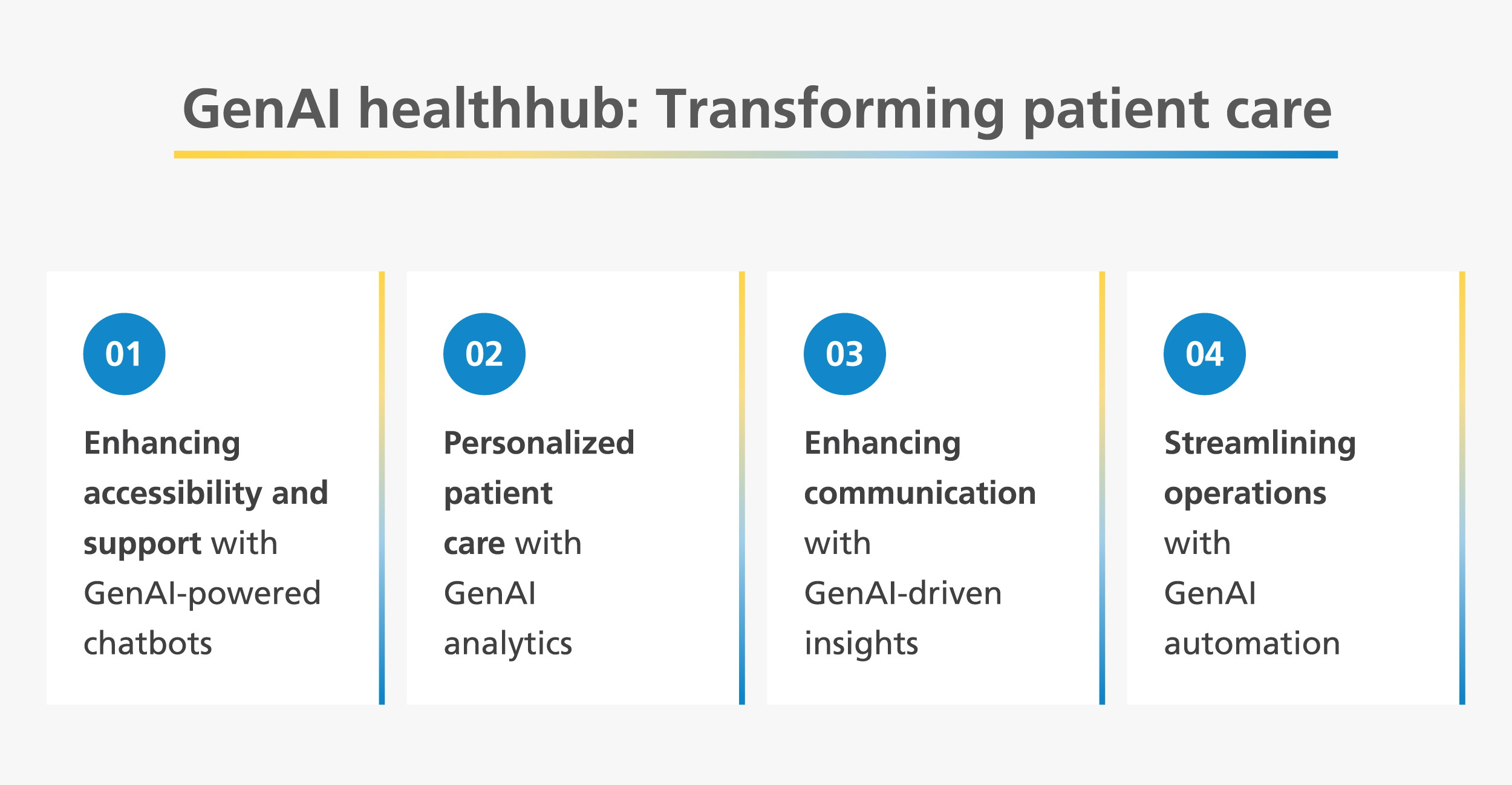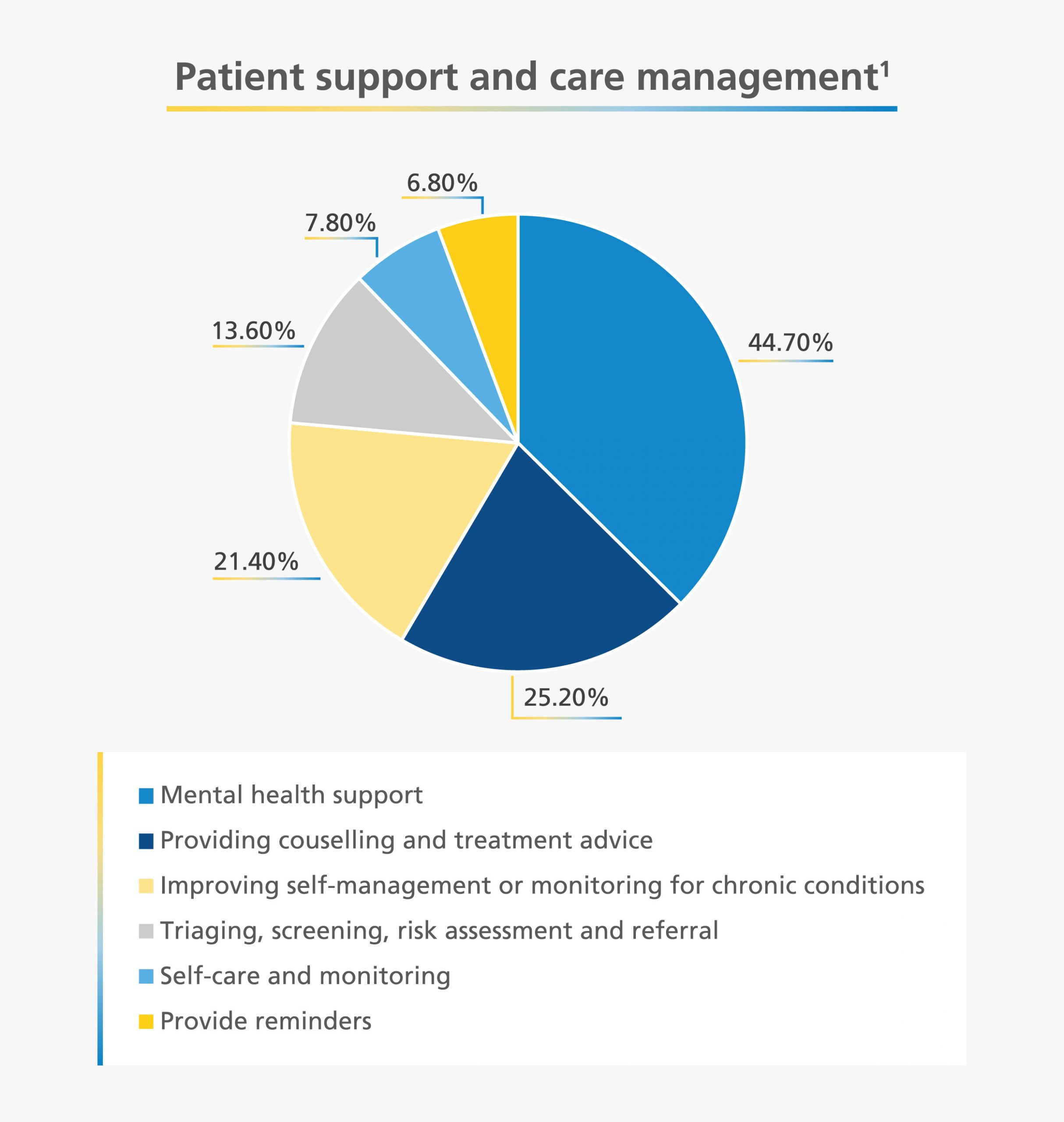From Data to Care: The Impact of GenAI on Patient Experiences
In today’s healthcare landscape, patient-centric care is more important than ever. As patients become more informed and demand higher levels of transparency and engagement, they expect the same quality of service they receive in other sectors. A positive patient experience has become a key factor in choosing healthcare providers, making it essential for healthcare organizations to prioritize and enhance the care they offer. With increasing patient expectations, delivering personalized, transparent, and responsive care is no longer just an option, it’s a necessity.
Patient-centric care is evolving with technological advancements like GenAI, telehealth, and patient portals, improving access and communication. Best practices include training healthcare professionals in empathy, supporting shared decision-making, personalizing care plans, collecting patient feedback, and enhancing care coordination. These strategies improve patient outcomes and loyalty. Neglecting patient experience can lead to dissatisfaction, eroding trust, increased stress, and poor health outcomes.
Enhancing patient experience with GenAI
GenAI HealthHub is a comprehensive solution for enhanced patient care. To enhance patient experience using GenAI, healthcare organizations must adopt a comprehensive strategy that leverages artificial intelligence to improve communication, personalize care, and streamline operations.


1 Roles, Users, Benefits, and Limitations of Chatbots in Health Care: Rapid Review, JMIR Publications, 23 July 2024
AI-powered chatbots: Enhancing accessibility and support
Conversational systems have emerged as powerful tools that can interact with humans through text and speech. These innovative technologies automate consumer interactions in multiple languages, enhancing engagement through text and voice queries. By leveraging consumer segmentation data, companies can use conversational systems to personalize products and improve interactions. However, these systems currently have limitations in understanding emotions and tone.6
GenAI-powered chatbots with conversational abilities and systems provide continuous support for patient inquiries, appointment scheduling, and basic medical advice, ensuring patients always have access to the help they need with swift responses. By offering preliminary symptom assessments and guiding patients on next steps, these chatbots make healthcare more accessible and responsive. Thus, these technologies are transforming how businesses and healthcare providers interact with and support their users, driving engagement, loyalty, and improved outcomes.
Personalized patient care with GenAI analytics
Self-adaptive hyper-personalization and generative AI are transforming multiple sectors, including healthcare, through a user-centric approach. Self-adaptive hyper-personalization leverages real-time data to understand user behaviors and trends, enabling businesses to refine strategies, optimize offerings, and innovate. This proactive approach addresses user preferences and pain points, reducing customer churn and driving engagement, loyalty, and business success. By leveraging AI automation, this approach dynamically tailors content and offers to each user fueled by customer expectations, real-time data, and practical frameworks.6
Similarly, in healthcare, generative AI analyzes patient data to predict health risks, enabling proactive and preventive care. By developing individualized treatment plans based on GenAI-driven insights from patient history and preferences, healthcare providers can offer personalized health recommendations and educational content. This ensures care is tailored to each patient’s unique needs, resulting in proactive interventions and customized care that improve patient outcomes and satisfaction. Together, these technologies highlight the transformative potential of AI in creating highly personalized and satisfying user experiences across various domains.
According to a 2023 article in the Journal of AHIMA, predictive analytics can help healthcare providers shift from reactionary to proactive care, improving operational efficiency and reducing staff burnout. 2
Enhancing communication with GenAI insights
In the realm of enterprise AI, GraphRAG is revolutionizing how organizations handle text data by automating the creation of knowledge graphs. Through semantic analysis, GraphRAG ensures accurate representation and context, highlighting relationships and connections within the data. This technology offers hierarchical summaries by identifying interconnected nodes, providing insights into themes and topics without the need for predefined questions. As a result, it significantly enhances the understanding and accessibility of complex datasets, making it a pivotal tool for improving data observability and understanding within large language models (LLMs).6
In healthcare, integrating GenAI enables transformative benefits. By analyzing patient feedback, GenAI identifies common concerns and areas for improvement, ensuring that patient voices are heard and acted upon. Additionally, GenAI-driven insights can enhance healthcare professionals’ communication skills, helping them create empathetic and personalized communication scripts. This fosters better patient-provider interactions, leading to effective feedback utilization and stronger patient relationships. Together, GraphRAG and GenAI exemplify AI’s power in enhancing both data management and human interactions, driving advancements in enterprise AI and healthcare.
By analyzing call center logs and survey feedback, a hospital improved patient satisfaction by 29% over six months by addressing negative sentiment drivers. 3
Streamlining operations with GenAI automation
Agentic AI transforms workflows by reducing the need for multiple applications and products, enabling seamless task execution through multimodal interfaces. These agents facilitate the integration of legacy systems and provide a natural framework for task allocation, planning, and actor preferences. This makes agents a crucial paradigm in modern AI research and applications.6
In healthcare, the implementation of GenAI and agentic AI can significantly optimize appointment scheduling, reducing no-shows and wait times, thereby ensuring efficient use of resources. Generative AI can also be used for the efficient allocation of medical staff and equipment, automating routine administrative tasks. By generating predictive models for resource management, GenAI optimizes operational efficiency, reduces administrative burdens, and minimizes patient wait times, enhancing the overall patient experience. Together, agentic AI and GenAI are powerful tools for streamlining workflows and improving efficiency across various sectors including healthcare.
Research in the Journal of Healthcare Management indicates that 67% of patients prefer to book their appointments online and AI resource management cuts hospital operational costs by 15%. 4
By integrating these AI-driven solutions into a single, cohesive strategy, healthcare organizations can create a more responsive, personalized, and efficient patient care experience. This comprehensive approach addresses current challenges and also adds significant value, ultimately transforming how healthcare is delivered.
Scenarios where a GenAI solution may not be feasible
- Complex medical queries
- Human expertise required: Chatbots may struggle with complex medical questions that require nuanced human expertise and judgment.
- Accessibility and usability
- Digital literacy: Patients with low digital literacy may find it challenging to interact with AI chatbots.
- Resistance to change: Healthcare professionals may resist adopting AI-driven training methods.
- Data privacy and security
- Data privacy concerns: Patients may be wary of sharing personal health data for AI analysis.
- Resource and cost constraints
- Resource constraints: Implementing AI analytics requires significant investment in technology and training.
- Initial setup costs: High initial costs for AI implementation may be a barrier for some healthcare organizations.
- Technical and operational challenges
- Technical issues: AI systems may face technical glitches, disrupting operations.
- Data interpretation: Misinterpretation of AI insights can lead to incorrect conclusions.
Future of GenAI in enhancing the patient experience
As healthcare evolves, leveraging generative AI in this sector offers unprecedented opportunities to enhance patient experiences by making care more proactive, personalized, and efficient. Here are the next steps in leveraging GenAI to transform patient care, ensuring:
Predictive and preventive healthcare
- Real-time health monitoring: Integrate GenAI with wearable devices and IoT sensors to continuously monitor patient vitals and health metrics. This will enable real-time alerts for any anomalies, enabling immediate intervention and preventive care.
Advanced AI-powered diagnostics
- AI-enhanced imaging: Use GenAI to improve the accuracy of medical imaging diagnostics, such as MRI, CT scans, and X-rays. This will help detect diseases like cancer early, leading to better outcomes.
- Virtual health assistants: Develop more sophisticated virtual health assistants capable of conducting detailed patient interviews, understanding complex medical histories, and providing preliminary diagnoses.
Holistic patient engagement
- Virtual reality (VR) and augmented reality (AR): Implement VR and AR for patient education and therapy. For example, VR can be used for pain management and mental health therapy, while AR can help explain complex medical procedures to patients.
- Emotionally intelligent chatbots: Enhance chatbots with emotional intelligence to better understand and respond to patient emotions, providing a more empathetic and supportive interaction.
Conclusion
The integration of GenAI in healthcare is poised to transform patient-centric care enabling enhanced patient experiences. This shift will entail leveraging AI-powered chatbots for 24/7 support, predictive analytics for personalized care, and AI-driven insights to improve communication and streamline operations. These technologies will lead to healthcare benefits such as reduced wait times, proactive care, and better patient-provider interactions. However, challenges such as data privacy concerns, digital literacy, and resistance to change must be addressed. Ultimately, embracing GenAI will lead to improved patient satisfaction, better health outcomes, and increased operational efficiency, setting a new standard for patient-centric care in the healthcare industry.
References
- Roles, Users, Benefits, and Limitations of Chatbots in Health Care: Rapid Review, JMIR Publications, 23 July 2024, https://www.jmir.org/2024/1/e56930/
- Using Data Analytics to Predict Outcomes in Healthcare, AHIMA Journal, 10 October 2024, https://journal.ahima.org/
- 15 Sentiment Analysis Statistics in 2024, Terry Tolentino, Marketing Scoop, 17 March 2024, https://www.marketingscoop.com/ai/sentiment-analysis-stats/
- Online Appointment Scheduling Statistics in 2023 (Data Matters), Jeff Beckman, Tech Report, 30 March 2024, https://techreport.com/statistics/business-workplace/appointment-scheduling-statistics/
- 10 AI in Healthcare Case Studies [2024], DigitalDefynd, https://digitaldefynd.com/IQ/ai-in-healthcare-case-studies/
- LTIMindtree AI Technology Trends Radar, https://www.ltimindtree.com/wp-content/uploads/2024/09/ltimindtree-crystal-ai-technology-trends-radar-2024.pdf
Latest Blogs
A closer look at Kimi K2 Thinking, an open agentic model that pushes autonomy, security, and…
We live in an era where data drives every strategic shift, fuels every decision, and informs…
The Evolution of Third-Party Risk: When Trust Meets Technology Not long ago, third-party risk…
Today, media and entertainment are changing quickly. The combination of artificial intelligence,…




